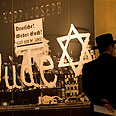
The material, held in 34 state-run and provincial archives, mainly includes files produced by the Nazi German authorities who occupied Poland during the war. But some of the archives also contain materials produced by Jews imprisoned in ghettos, amounting to rare and precious wartime testimony of huge value to historians, according to Yad Vashem Chairman Avner Shalev.
Shalev, who was in Warsaw for the signing, called it "a real step forward" for Holocaust researchers because it will give them easier access to material that has often been difficult for them to see, particularly during the communist era.
In particular, Shalev said he hopes that it will help the museum, memorial and research institute in Jerusalem identify up to about 250,000 Holocaust victims in Poland who remain unidentified.
"This is our wish and we are embarking on a very ambitious project to identify them," Shalev said.
Shalev said Yad Vashem has identified about 4 million of the 6 million Jews murdered by the Nazis. About 3 million of those were Polish Jews, and Yad Vashem still lacks names for about half of the Polish Jews and others in Eastern Europe.
The agreement allows Yad Vashem to systematically photocopy millions of documents and to integrate them into Yad Vashem's archives, where they will become available in the coming years to researchers and the general public, museum spokeswoman Estee Yaari said.
Yad Vashem was also one of the recipients of the roughly 6.5 terabytes of digitized files from the International Tracing Service of the Red Cross in Bad Arolsen, Germany. The materials include documents on concentration camps, ghettos and prisons, and files from displaced persons camps and emigration after World War II.
- Follow Ynetnews on Facebook















